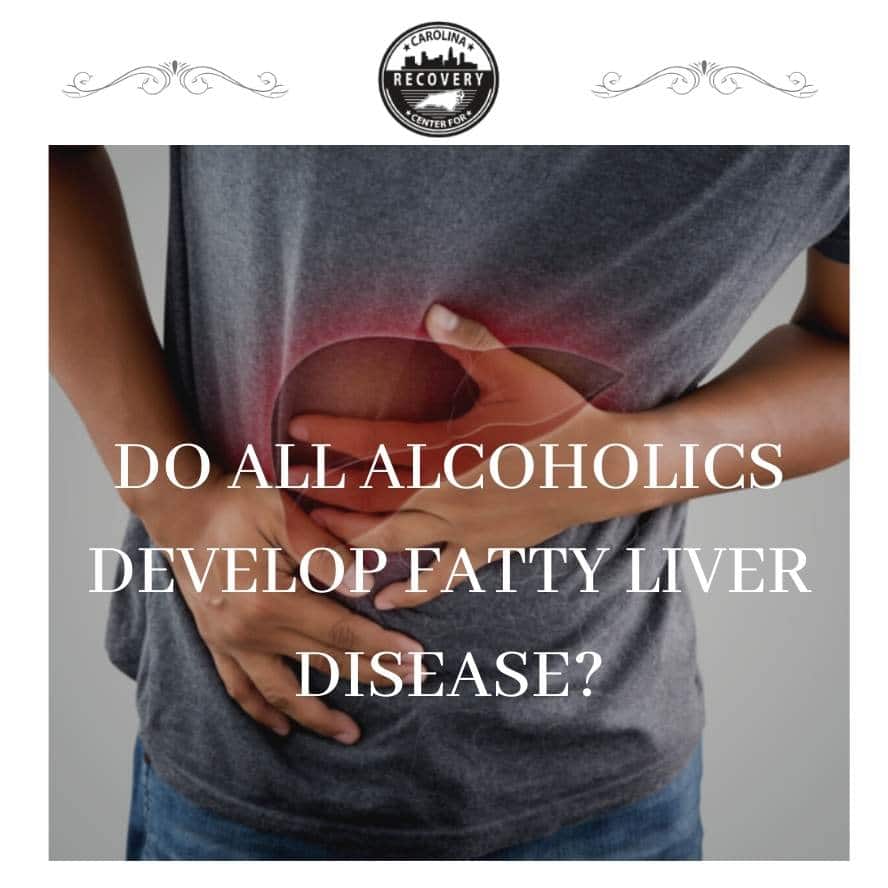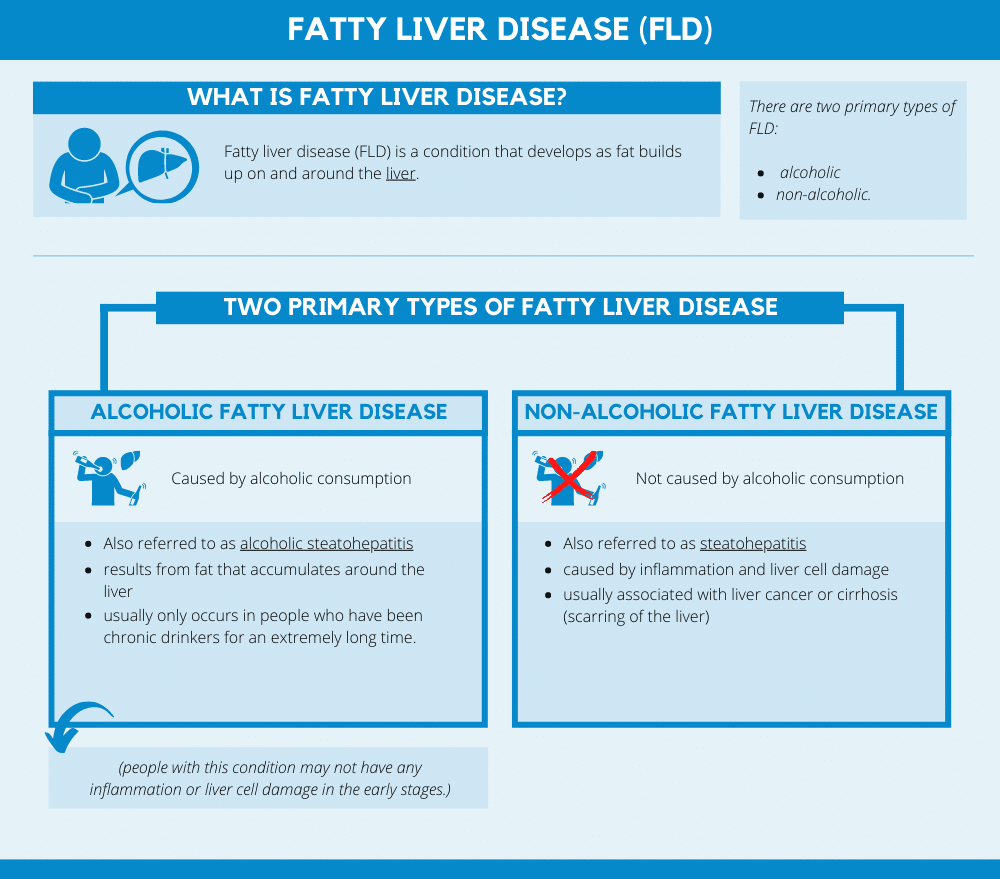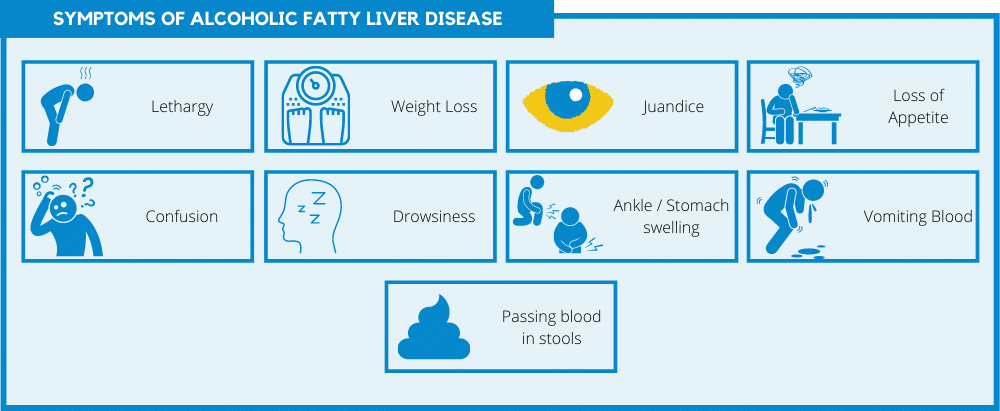Do All Alcoholics Develop Fatty Liver Disease?

Medically Verified: 2/1/24
Medical Reviewer
Chief Editor

All of the information on this page has been reviewed and verified by a certified addiction professional.
Alcoholic fatty liver disease (AFLD) is a quiet disease that often goes undiagnosed until it has progressed into a significantly more severe problem. People who drink excessively or are addicted to alcohol are prone to fatty liver. While fatty liver itself may not be deadly, it is the first sign that a more serious diagnosis is yet to come.
The good news is that alcoholic fatty liver can be reversed if people stop drinking and start taking care of their bodies. Unfortunately, simply stopping drinking isn’t that simple for some people.
What is Fatty Liver Disease (FLD)?

Fatty liver disease (FLD) is a condition that develops as fat builds up on and around the liver. There are two primary types of FLD: alcoholic and non-alcoholic. While alcoholic fatty liver disease (AFLD) is caused by alcohol consumption, non-alcoholic fatty liver disease (NAFLD) is not.
NAFLD is also referred to as steatohepatitis. This condition is caused by inflammation and liver cell damage and is usually associated with liver cancer or cirrhosis (scarring of the liver). AFLD, on the other hand, results from fat that accumulates around the liver. However, people with AFLD may not have any inflammation or liver cell damage in the early stages.
If a drinker has not developed liver damage, their condition may simply be referred to as “fatty liver.”
AFLD may also be referred to as alcoholic steatohepatitis. It usually only occurs in people who have been chronic drinkers for an extremely long time. Other factors that may increase a person’s risk of developing alcoholic fatty liver include people who are obese, those with certain genes, and women.[1]
Signs and Symptoms of Alcoholic Fatty Liver Disease
Unfortunately, alcoholic fatty liver disease is usually silent – especially in its earlier stages. If symptoms appear, they usually do so in the form of aches and pains in the upper right abdomen.
Since this disease has so few symptoms, it can be difficult to diagnose before it progresses into something more serious – such as an enlarged liver or cirrhosis. When the liver disease progresses, a person may experience the following symptoms:[2]

- Lethargy
- Weight loss
- Jaundice
- Loss of appetite
- Confusion
- Drowsiness
- Swelling in the ankles or stomach
- Vomiting blood
- Passing blood in stools
If someone regularly drinks in excess, they should speak with their doctor about testing for alcohol-related liver disease (ARLD).
Prognosis for Alcohol-Related Liver Disease
Aside from the brain, the liver is one of the most complex organs in the human body. It is responsible for helping digest food, filtering the blood, fighting disease and infection, and regulating blood sugar and cholesterol.[3]
The liver has a lot of responsibilities, so it is good news that it is an extremely resilient organ. The liver can develop new cells and regenerate itself. However, alcohol abuse can kill these liver cells, and, over time, reduce the ability of the liver to regenerate at all. This is when serious and permanent liver damage occurs.
As a result, people who stop drinking and start taking care of their body may be able to repair their liver and overcome alcoholic fatty liver disease. But, if a person continues drinking and fails to get help, AFLD can progress into something far more serious – like cirrhosis, cancer, or liver failure.
It is estimated that up to 20% of heavy drinkers develop fatty liver.[4]
Treatment for Fatty Liver Disease and Alcohol Abuse
Although there is no medicinal treatment for alcoholic fatty liver, the condition is treatable with lifestyle changes and can be reversed. The most important step in regards to treatment is to stop drinking and abstain from alcohol entirely.
In less severe cases of AFLD, people may only need to stop drinking for two weeks before the damage is undone. However, if a person abstains for two weeks, lets their liver clear up, then starts drinking again, he or she will be at a higher risk of developing fatty liver in the future. As a result, it is recommended that people with fatty liver disease abstain from alcohol altogether.[5]
Other lifestyle changes that can benefit individuals who are recovering from alcohol abuse and fatty liver include:
- Eat a balanced and healthy diet consisting of limited sugar, fresh fruits, and fresh vegetables
- Get regular exercise and lose weight
- Get vaccinated (hepatitis A, B, flu, and pneumococcal shots)
Heavy drinkers, especially those who have developed AFLD, may have a hard time giving up alcohol without professional help. And, these individuals may experience severe alcohol withdrawal symptoms when they first sober up. Rather than trying to quit alone, it is suggested that these individuals get help from an inpatient alcohol rehab program.
Alcohol use disorder (AUD) is a chronic and relapsing disease. If a person relapses, he or she will likely injure the liver even more, potentially leading to life-long consequences. As a result, long-term treatment for alcohol abuse is recommended for the best patient outcomes.
Treatment for Alcohol Abuse and Alcoholism
While not all alcoholics develop fatty liver, those that do need treatment. Alcohol abuse treatment usually consists of detox, inpatient, and outpatient rehab. Treatment can be very effective in helping people stay sober and improve their liver health.
At Carolina Center for Recovery, we have the clinical and medical staff on-site that is needed to help you begin your recovery journey. No matter how many times you’ve tried to quit before or how far your health has fallen, we can help you get back on track. Don’t wait any longer. Call now.
References:
- https://medlineplus.gov/fattyliverdisease.html
- https://www.ncbi.nlm.nih.gov/pmc/articles/PMC2271178/
- https://www.hopkinsmedicine.org/health/conditions-and-diseases/liver-anatomy-and-functions
- https://pubs.niaaa.nih.gov/publications/arh27-3/209-219.htm
- https://www.nhs.uk/conditions/alcohol-related-liver-disease-arld/

